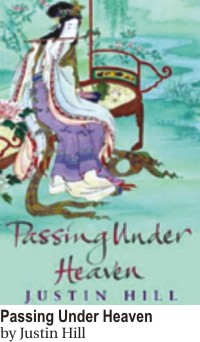|
Book
Review
Too beautiful to live
Zoë
Green
You might
think she was unlucky; others might think it was Yu Xuanji's
fate to be orphaned so young, to be sold as a concubine to
a man who would later betray her, to spend her latter days
as a courtesan and die at 26 on the executioner's block. That
her story is fascinating is undeniable and Justin Hill's narrative
brings the tale of China's most famous female poet vividly
to life.
Yu is
born to a soldier and his concubine in the 9th century in
the twilight years of the Tang dynasty. Her father is lost
in the marshlands and her mother, crippled by poverty, sells
her only daughter into marriage at six. Unable to deal with
the guilt, her mother commits suicide and her daughter's new
inlaws are forced to sell Yu on to avoid shame.
 She
is adopted by a kindly but childless scholar and his wife
and, for a while, all is well. Her name is changed from Little
Hope to Little Joy and her emerging beauty is the talk of
all the town. Unfortunately, her beauty and her wilfulness
are ultimately her downfall. She
is adopted by a kindly but childless scholar and his wife
and, for a while, all is well. Her name is changed from Little
Hope to Little Joy and her emerging beauty is the talk of
all the town. Unfortunately, her beauty and her wilfulness
are ultimately her downfall.
She catches
the eye of an eminent minister, Li, who buys her as his concubine.
Again, for a short while, all is well; they find themselves
in love and he treats her better than he might a wife. Together,
they have poetry battles and he finds her natural gift with
poetry endearing, if occasionally embarrassing in company.
However, when they visit Li's mother, Yu finds herself near
Li's official wife and things begin to go awry.
It becomes
a bitter tale of suspicion, jealousy and petty revenge. Yu
makes the unprecedented move of attempting to divorce her
husband but is shut up in a Taoist monastery; she flees and
seduces a renowned poet and friend of her husband. Her exploits
grow increasingly wild and her fame as a poet increasingly
touted. She is an exceptional woman in exceptional times but,
despite the freedoms that women briefly enjoyed, nothing can
save her from the law when she is found guilty of murder.
Intriguing
though Yu's story is, this is also the story of minister Li,
who proves to be an equally mysterious and unusual man for
his day. Hill's narrative leaves the impression that theirs
is a love story gone terribly wrong and, as in real life,
nobody ever understands why.
Despite
the remoteness of the material, Hill manages to give a contemporary
feel to the text and his translations of Yu's poems, which
were preserved for their curiosity value, have a freshness
that belies their age.
Justin
Hill has a keen eye for detail and both when describing the
humble and the elevated, his language, like Yu's, is elegantly
understated and refreshing. A former voluntary aid worker
in China and Eritrea, his knowledge of Chinese history, tradition
and etiquette is intricate without becoming tedious and the
novel is extraordinarily well crafted.
This article was first
published in the Guardian
Copyright
(R) thedailystar.net 2004
| 